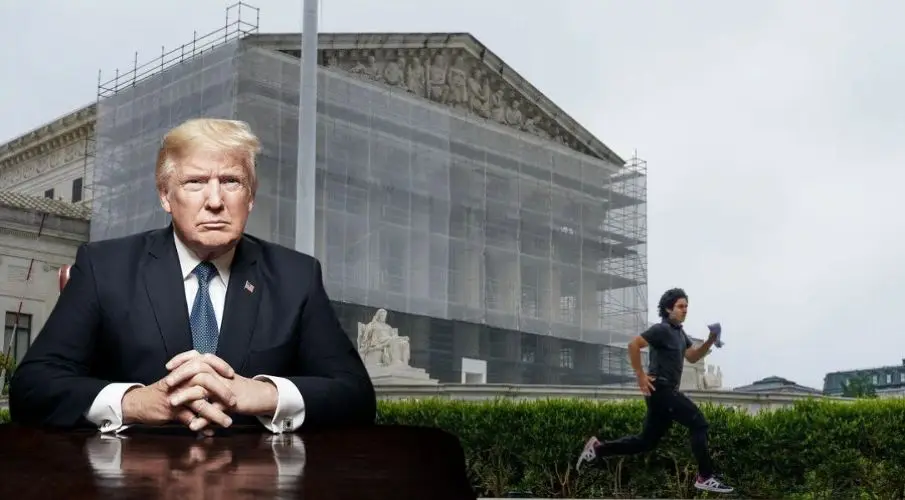Washington – It was a single sentence from the highest court in the land, yet its impact reaches millions: The Supreme Court on Tuesday extended the order blocking the payment of full food assistance benefits. While signs in Congress point to an end to the historic shutdown, one of the nation’s most vital social lifelines remains constricted.
The decision came in an emergency procedure, the so-called shadow docket – without oral arguments, without a written explanation, but with massive social consequences. According to the court, only Justice Ketanji Brown Jackson dissented, calling for the immediate resumption of full benefits. The remaining justices left in place the temporary hold – and with it, the decision by the Department of Agriculture to freeze the SNAP program until further notice.
Democratic Representative Rosa DeLauro condemned the cruelty of the decision in the Rules Committee as the ruling was announced.
Thus, the country remains trapped between hunger and hope. In some states, families have received their full allocations under the Supplemental Nutrition Assistance Program, while in others, not a single dollar has been distributed. For millions who depend on these benefits, that means empty refrigerators, desperate calls to aid organizations, and improvised meals from leftovers. About one in eight Americans is affected – children, single parents, retirees, and people who, despite working, do not earn enough to afford the basics.
The origin of this crisis lies in a decision by the Trump administration. In early October, at the start of the budget impasse, the Department of Agriculture cut funding for the SNAP program. The reasoning: without a new budget, no money could be released. But that decision triggered a wave of lawsuits across the country – accompanied by conflicting rulings, temporary injunctions, and frantic appeals. What began as a budget dispute quickly became a fundamental conflict over state responsibility and the right to food.
Meanwhile, political Washington is slowly moving toward a resolution. On Sunday evening, the Senate approved a compromise by a vote of 60 to 40 to end the longest shutdown in United States history. The bill now lies before the House of Representatives, which could vote on it as early as Wednesday. If the budget is passed, federal agencies would resume their work – including the Department of Agriculture, which is responsible for distributing food assistance. But until then, the Supreme Court’s decision remains in effect.
Even if the standoff ends, it remains uncertain when those affected will actually receive their money. Many states have shut down their systems, frozen balances on benefit cards, and halted scheduled payments. Grocers and food banks report growing strain as donation supplies run out. In soup kitchens from Chicago to Miami, families stand in line for hours to get bread, milk, and canned fruit – the basic foods of a nation that calls itself prosperous.

The Whitney Young High School and the Skinner Park Advisory Council are hosting a food drive in Chicago to support families in need during the SNAP funding freeze.
The Supreme Court’s decision extends this limbo – and reveals how deeply political power plays reach into the lives of the most vulnerable. The dispute over SNAP is no longer an administrative matter. It has become a moral test of endurance: How much responsibility does the state bear for those who cannot survive without it? How much responsibility does a society bear to keep the power of its governments from becoming overwhelming?
Investigative journalism requires courage, conviction – and your support.
Please help strengthen our journalistic fight against right-wing populism and human rights violations. Every investigative report, every piece of documentation, every day and every night – all of it requires time, research and legal protection. We do not rely on advertising or corporations, but solely on people who make independent journalism possible. People like you.
Not everyone can give the same amount. But everyone can make a difference. Every contribution protects a piece of journalistic independence.

Nur eine einzige Gegenstimme?? 😯
jap
Hat Trump jetzt auch die demokratischen Richter in der Tasche?
Wie beschämend ist diese Entscheidung?
Dann sind die 8 Richter wohl mächtig stole auf sich.
Hoffentlich schlägt das Karma zu.
Ich weiß wirklich nicht mehr, was ich in Anbetracht der Abscheulichkeiten sagen soll.
Wenn jetzt demokratische Senatoren einknicken und 2 demokratische Supreme Court Richter gegen den Hunger entscheiden.
Wo bleibt da die Hoffnung?
Die bleibt auf der Strecke 😿